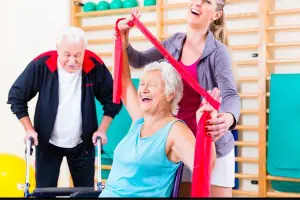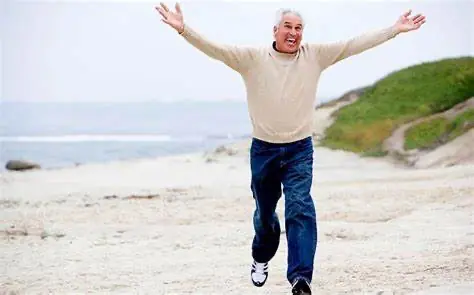The Importance of Physical Activity for Seniors: Staying Active and Healthy at Home
It is also very strange that, as we age, many of us transition to a sedentary lifestyle. Symptoms like the comfort of sitting on a reclining chair or watching TV and having leisure may be tempting; however, it is essential to be active as much as possible in the elderly’s case. In this discussion, the effectiveness of all forms of exercise will be discussed alongside the recommendations which the elderly can make as to how they can engage in activities especially when they involve home care services.
The Mental Benefits of Exercise for Seniors:
Exercise is not only good for physical health but also has a positive impact on mental well-being. Engaging in physical activity releases endorphins, which can enhance mood and alleviate symptoms of depression and anxiety. Moreover, staying active stimulates cognitive function, helping to stave off cognitive decline and lowering the risk of developing conditions such as dementia. For additional support, a fenugreek seed supplement Amazon can be considered as part of a holistic approach to maintaining cognitive health.
The Importance of Regular Exercise for Physical Health:
One of the key advantages of regular exercise is its role in preserving physical health. Engaging in physical activity helps prevent and manage various health issues that tend to arise as we age, such as heart disease, diabetes, osteoporosis, and arthritis. Additionally, it supports maintaining a healthy weight, which is crucial for overall well-being.
Enhancing Strength and Flexibility Through Regular Exercise:
As we get older, our muscles tend to weaken, and our joints may lose flexibility. Consistent exercise can significantly improve muscle strength, boost flexibility, and enhance balance. These benefits help lower the risk of falls and injuries, which can be especially harmful for seniors.

The purpose of social benefits section:
Group exercise classes, or even simple walks with friends, are important social interactions that seniors can get from group exercise classes. People may feel lonely and isolated in later life, getting involved in exercise is a great opportunity to meet others and be part of a community.
Improving Sleep Quality through Specific Activity:
It is not unusual that elderly people experience sleeping disorders, Nevertheless, adequate physical exercise contributes to normalizing the sleep cycle and improves sleep. It is equally important to note that one needs to sleep well in order to remain healthy and full of energy the next day.
The Importance of Staying Active as You Age
Staying physically active becomes increasingly vital as you grow older. Regular exercise can help:
- Reduce your risk of heart disease, stroke, type 2 diabetes, and certain cancers
- Enhance your strength and balance, which helps prevent injuries and maintain independence
- Alleviate pain
- Boost your mood
- Mitigate symptoms of anxiety and depression
- Enhance cognitive abilities, including thinking, learning, and decision-making
Strategies for Resistance Training:
Ideas on how to exercise, include exercising with bands and lifting hand weights to develop strength. In the absence of weights you can use anything you have at home, such as books or cans of food. In addition, you can exercise on your own body weight, for instance, you can do squats or lunges. Of course, you should avoid holding your breath during these activities as it can create dangerous changes in blood pressure.
Initial Steps to Take in Physical Activity:
If you have not exercised in quite some time or are a beginner, it is possible to do so safely and effectively by gradually increasing your workouts. Yes, as little as 5 minutes of physical exercise is healthy and will only gain more time as time goes on! Choose exercises which get to the heart rate like normal walking, dancing, swimming or raking among others. It is important that the regular doctor is told if there is development of breathing difficulties, occurrence of chest pains or loss of weight.
Selecting Suitable Exercises for Seniors:
Seniors should choose exercises that align with their fitness level and physical capabilities. Low-impact options like walking, swimming, or gentle yoga can be great choices.
Start Slowly:
It’s important not to overdo it. Begin with short, manageable workouts and gradually increase both the duration and intensity as your fitness improves.
Incorporate Strength Training:
Adding strength training exercises using resistance bands or light weights can help maintain muscle mass and bone density.
Stay Hydrated:
Seniors are at a higher risk for dehydration, so it’s essential to drink plenty of water before, during, and after exercising to stay properly hydrated.
Conclusion:
Exercise plays a crucial role in leading a healthy and fulfilling life for individuals of all ages, particularly for seniors. The advantages of consistent physical activity—ranging from improved physical health to enhanced mental well-being—are clear. By encouraging and supporting our elderly loved ones to stay active, we can contribute to a longer, happier, and more fulfilling life. Let’s make a commitment to prioritize exercise for seniors and utilize home care services to help them enjoy the many benefits that come with staying active!



This is such an informative post! Staying active and maintaining physical well-being is essential, especially for seniors. For those looking to complement their healthy lifestyle with body-enhancing treatments, options like body contour Montebello, CA can help boost confidence by addressing stubborn areas.